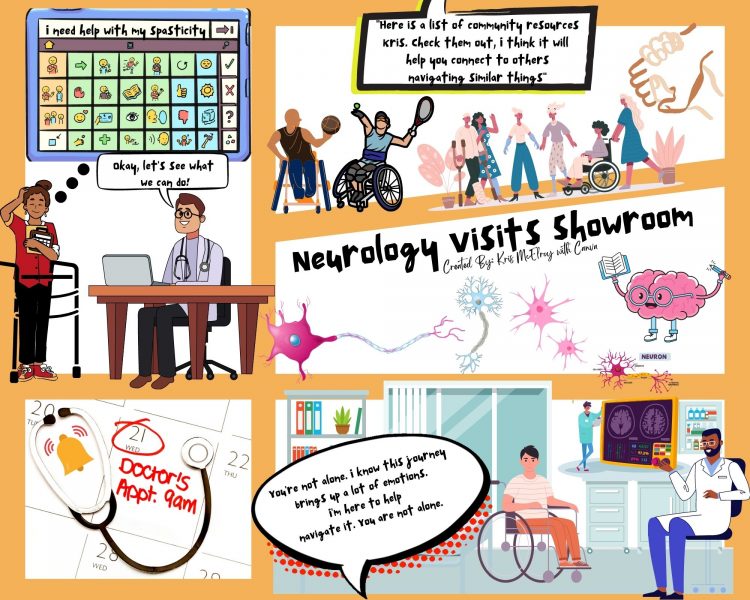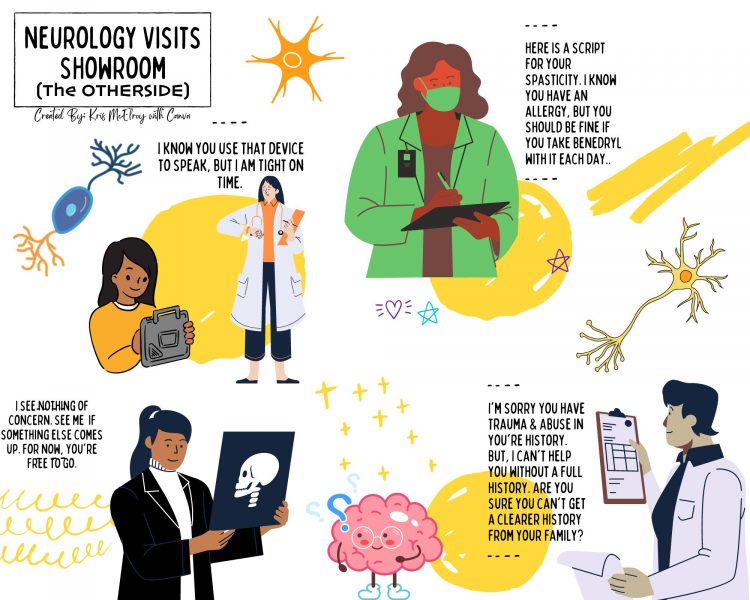My journey with doctors has often felt like the online dating platforms swiping left or right after an appointment. I’d start with “Hi, my name is Kristian. I go by Kris. Nice to meet you”. If the response was “Kristina…” it was usually a swipe left by the end of the first visit. But, if the response was “Hi Kris, nice to meet you. How can I help you/what brings you in today?” then we proceeded with a swipe right on the neurologist journey. I’ve been seeing neurologists since I was 7 years old and the journey shows no sign of slowing down anytime soon. Finding a good neurologist is still, for me, a rare gift.
When I was 7, a good neurologist was the one who could make me laugh and had a lollipop at the end of the visit. A bad neurologist was one where the visit was in a cold room, there were no jokes, no lollipops, and they didn’t talk to me much while examining me and running tests which made me tired and my body hurt more.
As I got older, general neurology became more specialized and I knew the routine of the same tests being run over and over again. Sure, what was once thought cerebral palsy was taken off the table with the certainty of complex hereditary spastic paraplegia that then turned to the possibility of ALS, that then turned to spinocerebellar ataxia, then multiple sclerosis… and round and round. The diagnosis circle continued as tests showed there were neurological symptoms, motor neurons were affected, it was progressive, and had a genetic component. The key piece that continued to be missing time after time was a definitive clear diagnosis. But, in times of uncertainty and navigating the neurology of my body, the neurologist — good or bad — made all the difference, for better or worse.
I’ll never forget the neurologist that changed my world. He acknowledged how long the journey had been, was realistic about finding/not finding clear answers, and educated me on my conditions and how to manage them while also having clear boundaries and expectations. He valued my voice, whether I was speaking, using my AAC devices, or writing — no matter how long it took. He saw me as a person — my interests, my fears, my stress and hesitations, and my desire to be active and hold onto what was important to me. He used my correct pronouns and spelled my name correctly in all spaces and reports. He talked to me with such compassion about treatment options, genetic testing, how to move forward, driving, physical therapy, using a walker and wheelchair, and my young onset dementia diagnosis due to neuromuscular disease while connecting me to great resources in the form of community support, cognitive therapy, speech therapy, and a neuropsychologist. Instead of reducing me, he helped empower me in some of the darkest, scariest times I faced medically.
So, in my experience, the top 7 characteristics that make up a good neurologist include:
- Communicates to me in a way I can understand, without treating me as less than.
- Connects me to resources.
- Discusses the diagnosis route vs. the condition treatment/management route in terms of rare neurological conditions where testing and diagnosis are still limited.
- Treats me as a person first, always.
- Takes time and collaborates.
- Doesn’t run non-medically necessary tests and uses informed consent.
- Honest, board-certified, experienced, and first, does no harm.

On the other side, the top 7 characteristics that make a bad neurologist are:
- Consistently spelling my name wrong; saying my name wrong and/or using the wrong pronoun.
- They don’t allow me to use my own voice or see my input as part of the treatment plan.
- They don’t offer any education on the conditions or what I’m experiencing or the medication they’re offering especially after asking.
- They never follow up or admit that they don’t know.
- They don’t engage with me about referrals they are making to make sure that they’re accessible to me.
- They don’t take a full history or do a thorough evaluation.
- They minimize my concerns or pass them off.

For me the most important thing is to find a neurologist (or any doctor for that matter) with whom I can develop a good doctor-patient relationship, communicate openly, and that is the right fit for me.

